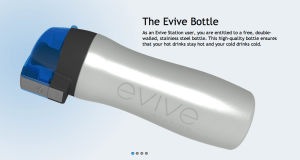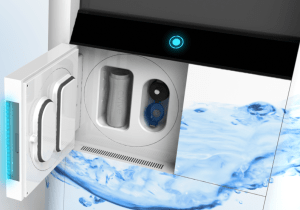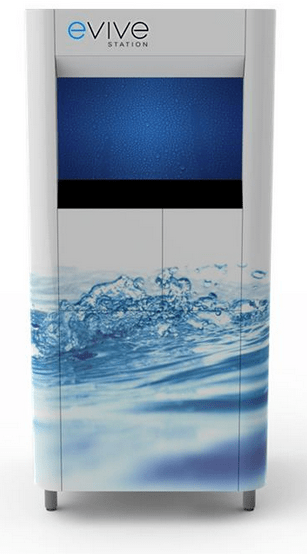While we all need water to survive, colleges and universities across the U.S. are betting that their students can survive without water of the bottled variety. As Bloomberg recently reported, more than 90 universities, including Brown and Harvard, are banning or restricting the sale of plastic water bottles. Considering that bottled water represents a $22 billion industry in the U.S. and that more than 9 billion gallons were sold last year, the actions of these universities aren’t likely to scare “Big Water,” as they represent just a fraction of sales. But it makes an important statement about bottled water nonetheless.
And let’s be honest: Whether or not you’ve recently hugged a tree, buying branded tap water in a plastic bottle for $1.50+ a pop seems … well … completely #$%^&-ing ridiculous — unless of course your village has yet to secure a reliable source of potable water. In that case, we understand. But, with colleges (and apparently Concord, Massachusetts) moving to or actually banning bottled water, a Pennsylvania-based startup, called Evive Station, has developed an innovative, ergonomic solution for providing campuses (and beyond) with a better alternative.
Like cellphone recycling startup, ecoATM, Evive has decided to go with the kiosk approach to the bottled water problem. With design help from Daedalus, the startup developed its “stations” to provide campuses with the world’s first on-site bottle cleaning and filtered water-dispensing service.
That doesn’t sound that cool, says the 16-year-old cynic in you. And you’re right, plenty of universities and organizations provide what are known as “sinks” and “dishwashers” and “hydration stations” often called “water fountains.” Fair enough. But even if you buy a plastic water bottle and use it once, it can get filthy pretty quickly, and sticking it in the dishwasher isn’t a workable solution.
 So, what’s cool about Evive is that they offer users double-walled stainless steel reusable bottles, which means no more plastic, and lower carbon footprints. In turn, their kiosks filter municipal water, offer unlimited re-filling and cleaning of those steel bottles by way of a patent-pending process that only takes a minute. And everything other than the bottles are free.
So, what’s cool about Evive is that they offer users double-walled stainless steel reusable bottles, which means no more plastic, and lower carbon footprints. In turn, their kiosks filter municipal water, offer unlimited re-filling and cleaning of those steel bottles by way of a patent-pending process that only takes a minute. And everything other than the bottles are free.
The stations are also designed to dispense bag-in-box concentrated, flavored water drinks, hot beverages, and multivitamin options, so that pale, sickly looking college students that haven’t seen the light of day as they cram for exams can get their daily dose of vitamins.
But, seeing as the service is free, that Evive is offering to install these stations on campuses for free, and is sweetening the deal with something called the “Precycling Grant” — which essentially means that the more students use the station, the more Evive gives back to the university — you might wonder whether this is purely mission-driven or whether Evive actually has a business model. And that’s where it gets interesting. Or crazy, depending on your point of view.
During the minute that students wait for Evive Stations to clean and fill their water bottles, the kiosks’ 32-inch high-def screens serve them interactive advertisements, internship opportunities, campus messaging, and offers. Evive Co-founder and CFO Jason Yablinsky tells us that the team wants to use advertising to offset the costs. Students go to Evive’s website, create a user profile, at which point the site asks them for some relevant demographic info. After checking appropriate boxes, they receive a redemption code which is linked to an RFID tag inside their new bottle.
Each time they go to a kiosk, they scan their bottle’s tag, and the cleaning and re-filling begins. The demographic data they collected from the student on their site is connected with the RFID tag, and they’re then served targeted ads that are relevant to their age, the classes they’re taking, what year they are, etc. While those ads and job opportunities play on the screen, students can request more information or post/tweet messages to their social media profiles linked to their user profiles.
Evive also plans to make space both on the kiosks and the water bottles distributed to students available for branding (which it’s offering for free now, but for purchase down the road), as well offering discounts and deals at local restaurants or coffee shops that will be relevant to hungry students looking for a bite, for example. Along with proximity ads that display digital billboards when someone walks by the station. Plus, they plan to offer realtime tracking of the amount of plastic bottles saved from the landfill, which campuses can then display to feel good about how green they’re becoming. Good PR for them as well as saving them from the cost of distributing bottled water.
 There’s obviously a lot going on — a lot of moving parts in the Evive user experience — and that may make it a tough sell for some universities. And, really, Evive is attempting to blend a number of different industries and operations in one — beverage distribution, cleaning, campus/organizational services, steel bottle manufacturing and distributing, and so on. It’s an ambitious project, but one that the team is hoping has enough appeal in cost-savings and sustainability that it will outweigh the rest.
There’s obviously a lot going on — a lot of moving parts in the Evive user experience — and that may make it a tough sell for some universities. And, really, Evive is attempting to blend a number of different industries and operations in one — beverage distribution, cleaning, campus/organizational services, steel bottle manufacturing and distributing, and so on. It’s an ambitious project, but one that the team is hoping has enough appeal in cost-savings and sustainability that it will outweigh the rest.
Evive has enlisted Flextronics — an electronics manufacturing services provider which counts Cisco Systems, Eastman Kodak, HP, Motorola, Dell, Oracle, and more as customers — to produce its kiosks. The startup has also raised $2 million in seed funding to get the ball rolling, and is currently in the process of closing a much larger Series A to help it expand to universities across the country. The team is tentatively planning to be in up to 30 universities by the year’s end.
Right now, Evive is testing its system at West Virginia University, where it’s placed four stations in various buildings. Over 4K students have signed up to use Evive, and the co-founders tell us that they can’t distribute water bottles fast enough. So far, they’ve had a lot of interest from both big state schools and private colleges. They aren’t ready to say who they’re working with yet, but they’ve been encouraged by the interest both from campuses, organizations, and investors.
And to that point, the team is focusing on universities now, and for the near future, but eventually wants to open up its service to businesses, corporations, and more.
What do you think? Is Evive an innovative, ergonomic solution or just full of water?
For colleges, universities, or anyone else interested in the service, check out Evive at home here, or in the video below:































Comment